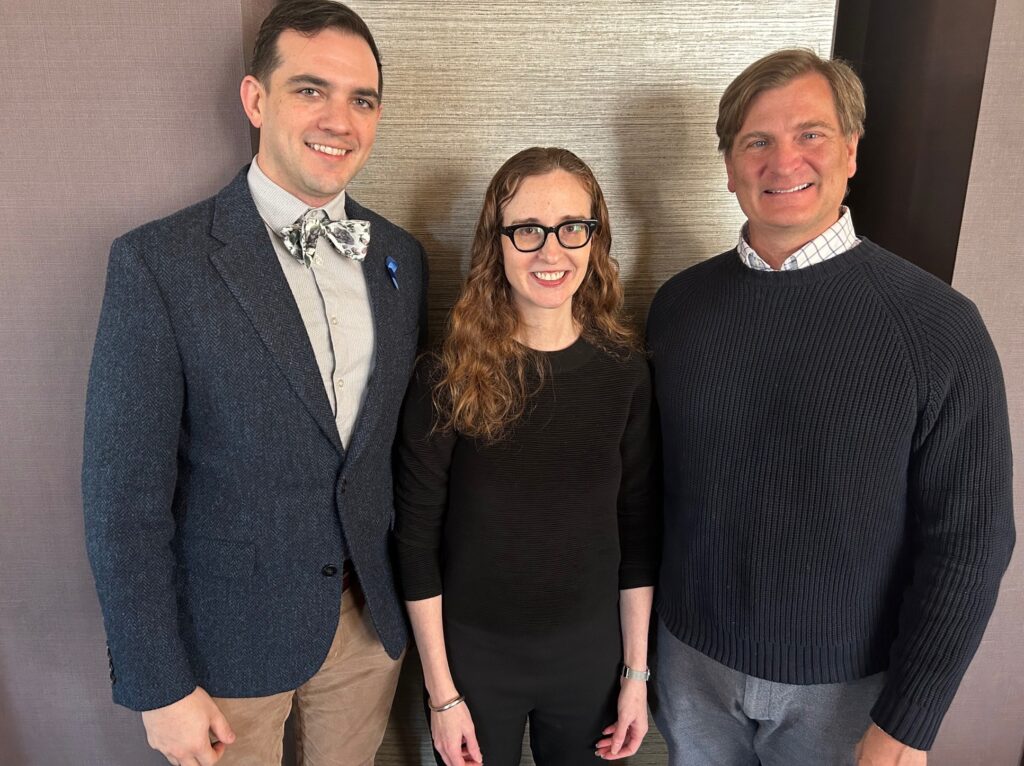Theater J’s Hayley Finn Asks, ‘What Is Jewish Theater?’
By • November 20, 2023 0 768

What is Jewish theater?
“I ask myself that question every day,” said Hayley Finn, who became Theater J’s fifth artistic director in February, after nearly 16 years at Minneapolis incubator space Playwrights’ Center.
“Keeping the question alive” — continuing to search for new answers — is part of Jewish tradition, explained Finn, speaking at The Georgetowner’s Nov. 16 cultural breakfast at the Four Seasons Hotel. She added: “Every play I program answers the question in a different way.”
As an example, Finn offered “This Much I Know,” opening at Theater J on Jan. 31. Jonathan Spector’s play, which she will direct, having helped develop it at Playwrights’ Center, is based on research by psychologist Daniel Kahneman, author of “Thinking, Fast and Slow.” Though there “aren’t any explicitly Jewish characters,” she noted, the piece — which includes appearances by actors playing, among others, a white nationalist and Stalin’s daughter — grew out of conversations between two Jewish writers and thinkers, Spector and Kahneman.
Coming more directly out of Jewish experience is the play that follows. On March 27, Theater J will present the world premiere of “Hester Street” by Sharyn Rothstein, based on Joan Micklin Silver’s 1975 film, which drew on an 1896 novella of New York’s Lower East Side by Abraham Cahan.
“Although it’s an old story, it’s still new,” said Finn, explaining that “it’s about assimilation and what it means to come to another country.” The largest production that 238-seat Theater J — “a small house,” in her words — has ever attempted, “Hester Street” will be directed by Oliver Butler. Not a musical, per Finn, since the songs are incorporated into the scenario rather than advancing the narrative, it is billed as “a play with music,” composed by Joel Waggoner.
Mentored by playwright Paula Vogel at Brown University, Finn pointed out that Theater J’s current season, which she programmed, includes more plays written by women than by men — “still unusual,” she commented. Iris Bahr’s “See You Tomorrow,” the first of three new one-person plays in a row — the others are Michele Lowe’s “Moses” and Sun Mee Chomet’s “How to Be A Korean Woman” — recently opened.
According to Finn, the latter represents her and Theater J’s commitment to portray “the changing landscape of Jewish identity.” She asked, rhetorically: “How can we be sure that the stage is reflecting the diversity of the Jewish experience?” One reason that Finn “fell in love with the mission” at Theater J is its new commission program for racially and ethnically diverse Jewish playwrights, Expanding the Canon.
What else attracted Finn to Theater J? Its base at the Edlavitch DC Jewish Community Center on 16th Street Northwest, a dozen blocks north of the White House. Apart from the unique opportunity to present Jewish theater (as continuously redefined) where national policy is made, she finds being part of a community hub stimulating: “You see kids in the hallway, you see people going swimming.” With this multigenerational community in mind, Theater J will be launching family programs for the first time, Finn said.
When she began to bring new plays to life in Minneapolis and elsewhere — both plays based on historical events and “plays about this moment,” including George Brant’s “Grounded,” which just premiered as an opera at the Kennedy Center — Finn soon realized “these are plays that are changing who I am,” even making her “a better citizen of the world.”
A key experience came in 2011, when she directed “Why We Laugh,” based on a rediscovered cabaret written and performed during World War II by Jewish inmates in the Theresienstadt ghetto/concentration camp. The breakfast attendees were amazed to hear how the piece was performed in the Czech Republic, both at a festival in Prague and in an attic in Terezín (the former Theresienstadt) itself, with family members of the original creators and the one surviving writer in the audience.
Theater, Finn stated, “has the capacity to open people’s hearts” and “ultimately, to encourage empathy.” Responding to a question about whether Theater J would be addressing the current Israeli-Palestinian tensions, she said she was “very open to that,” and that her approach to programming was “artist-driven.”

